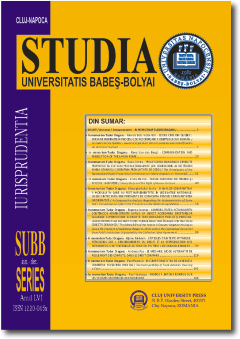JUDECĂTORUL ȘI FABULISTUL ORHEIAN ALECU DONICI, PRECURSOR AL ETNOLOGIEI JURIDICE ROMÂNEȘTI
THE JUDGE AND FABULIST FROM ORHEI, ALECU DONICI, A PRECURSOR OF ROMANIAN LEGAL ETHNOLOGY
Author(s): Valerius M. CiucăSubject(s): Sociology of Law
Published by: Studia Universitatis Babes-Bolyai
Keywords: Legal ethnology; fable; judicial morals; propensity for justice; public morals; legal and moral decay; Alecu Donici judge; Alecu Donici fabulist;
Summary/Abstract: Paul Valéry said about fables as follows: “Little by little those who loved or liked it, those who were able to understand it disappear. Those who demanded it, those who broke it, those who bantered it died too ... Soon, an instrument of pleasure and emotion will become a school accessory; what used to constitute the truth, what used to constitute the beauty turns into a means of constraint or into an object that arouses curiosity, but a curiosity which forces itself to be curious." ("Oraison funèbre d´une fable", in Variétés, apud Sanda Radian, Măștile fabulei. Etape de evoluție în literatura română (The Fable Masks. Stages of Evolution in Romanian Literature), Minerva Publishing House, Bucharest, 1983, p. 5)In a recent conference, held in Suceava , I expressed some regrets in relation to the absence of scientific concerns in the vast and important field of legal ethnography and ethnology in Romania, as follows: "Legal ethnography and ethnology are not obviously, in particular, delimited in Simeon Florea Marian's grandiose work. General science was in the course of being established; it was not the time for particularistic developments. It was late when by means of another pioneering work, that of the Romanian scholar and anthropologist Romulus Vulcănescu, some issues of concern for our jurists, for law sociologists and anthropologists started to be reflected in the Romanian legal culture. Very few. Even the great ethnologist Petru Ursache acknowledged that the domain was deficient, in his very impressive creation of ethnosophy". As for the fable, apparently a minor literary genre, so much lamented, as we have seen above, by Paul Valéry, as an object of historical contemplation only, the intersection of the legal culture with the sapiential, moral and literary spirit of the people increases considerably; so much that it becomes a valuable scientific landmark in the emergent legal ethnology twinned with legal sociology, with legal anthropology and with legal folklore . In the most serious way, even if, isn’t it true, with hilarious and caricaturizing weapons, with a playful and clever spirit, the fable decrypts a people's propensity for truth and justice or, conversely, for gregarious fatalism in relation to the vices that corrupt the nation psychologically and morally. Its role is didactic. The young jurists would become scientifically and culturally ennobled if they took over the case law, the "cases", from the fables ... Or if, their masters guided them towards associating the case law with the comic and fabulising spirit of the wise judge ...
Journal: Studia Universitatis Babes Bolyai - Iurisprudentia
- Issue Year: 65/2020
- Issue No: 4
- Page Range: 212-245
- Page Count: 34
- Language: Romanian

